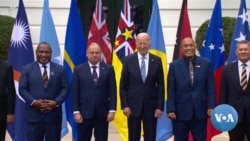ການປ່ຽນແປງຂອງດິນຟ້າອາກາດແມ່ນຄວາມກັງວົນຫຼັກຂອງບັນດາຜູ້ນໍາໃນກອງປະຊຸມສຸດຍອດ ບັນດາປະເທດເກາະດອນປາຊີຟິກ ທີ່ໄດ້ພົບປະກັບປະທານາທິບໍດີ ໂຈ ໄບເດັນ ເມື່ອວັນຈັນແລ້ວ ໃນຂະນະທີ່ທໍານຽບຂາວ ເພັ່ງເລັງໃສ່ໄພຂົ່ມຂູ່ອື່ນໆໃນພາກພື້ນ ເຊັ່ນຄວາມທະເຍີທະຍານທີ່ເພີ່ມຂຶ້ນຂອງຈີນໃນເຂດທະເລຍຸດທະສາດ. ໃນວັນຈັນ, ທ່ານໄບເດັນ ໄດ້ໃຫ້ຄຳໝັ້ນສັນຍາທີ່ມີມູນຄ່າຫຼາຍລ້ານໂດລາສະຫະລັດ ທີ່ຈະຕ້ອງໄດ້ຮັບການອະນຸມັດຈາກລັດຖະສະພາ. ອານີຕາ ພາວແວລ ນັກຂ່າວວີໂອເອ ລາຍງານຈາກວໍຊິງຕັນ ເຊິ່ງອາດນາສັກມີລາຍລະອຽດ.
ປະທານາທິບໍດີ ໂຈ ໄບເດັນ ໄດ້ເລີ່ມຕົ້ນການປະຊຸມສຸດຍອດຂອງບັນດາປະເທດເກາະດອນປາຊີຟິກໃນປີນີ້ດ້ວຍການຂໍໂທດ ແລະການສະແດງຄວາມຂອບໃຈ: ໃນເບື້ອງຕົ້ນ, ໄດ້ສະແດງຄວາມເສຍໃຈຕໍ່ການຍົກເລີກການຢ້ຽມຢາມ ປາປົວ ນິວ ກີນີ ໃນເດືອນພຶດສະພາ ທ່າມກາງສະຖານະການທາງການເມືອງພາຍໃນປະເທດ - ແລະຫຼັງຈາກນັ້ນ, ຊົມເຊີຍການຮັບຮູ້ທາງການທູດສະຫະລັດຕໍ່ຫມູ່ເກາະຄຸກ (Cook) ແລະ ປະເທດເກາະດອນນ້ອຍໆນິວເອ (Niue).
ນອກຈາກນີ້ ທ່ານຍັງໄດ້ສຸມໃສ່ຄວາມກັງວົນ ກ່ຽວກັບດິນຟ້າອາກາດທີ່ລະບຸໂດຍບັນດາ 18 ປະເທດໃນເວທີສົນທະນາຂອງເກາະດອນປາຊີຟິກ, ແລະໄດ້ໃຫ້ຄຳໝັ້ນສັນຍາວ່າຈະສະໜອງທຶນຊ່ວຍເຫຼືອດ້ານດິນຟ້າອາກາດ ແລະພື້ນຖານໂຄງລ່າງ. ໂດຍທ່ານ ໄດ້ກ່າວວ່າ:
“ພວກເຮົາໄດ້ຍິນຄຳເຕືອນຂອງທ່ານ ກ່ຽວກັບລະດັບນ້ຳທະເລທີ່ເພີ່ມຂຶ້ນ ແລະພວກມັນເປັນໄພຂົ່ມຂູ່ຕໍ່ປະເທດຊາດຂອງພວກທ່ານ. ພວກເຮົາໄດ້ຍິນຄວາມຮຽກຮ້ອງຂອງທ່ານ ເພື່ອຮັບປະກັນວ່າພວກທ່ານ ຈະບໍ່ເຄີຍ ບໍ່ເຄີຍ ບໍ່ເຄີຍສູນເສຍສະຖານະຄວາມເປັນປະເທດ ຫຼືສະຖານະສະມາຊິກຂອງທ່ານ ຢູ່ໃນສະຫະປະ ຊາຊາດອັນເປັນຜົນມາຈາກວິກິດການດິນຟ້າອາກາດ."
ບັນດາສະມາຊິກ 18 ປະເທດເຫຼົ່ານີ້ ໄດ້ເປັນສະຫນາມລົບຂອງການຍາດແຍ່ງອານານິຄົມມາເປັນເວລາຫຼາຍສັດຕະວັດ. ໂດຍສະເພາະ ຫມູ່ເກາະຄຸກ (Cook) ທີ່ໄດ້ຖືກຕັ້ງຊື່ຕາມຄັບຕັນ ເຈມສ໌ ຄຸກ (Captain James Cook) ນັກຜະຈົນໄພຜູ້ບໍ່ມີຄວາມຢ້ານກົວ ຊາວອັງກິດ ຜູ້ທີ່ ໃນທ້າຍສະຕະວັດທີ 18 ໄດ້ບຸກເຂົ້າຍຶດເອົາດິນແດນຂອງຊົນເຜົ່າພື້ນເມືອງ ໃນທົ່ວພື້ນທີ່ອັນກວ້າງໃຫຍ່ຂອງປາຊີຟິກ ຢ່າງໂຫດຮ້າຍ - ນັບຕັ້ງແຕ່ອອສເຕຣເລຍໄປຈົນເຖິງການາດາ - ເພື່ອປົກຄອງ.
ນັ້ນແມ່ນສິ່ງທີ່ນາຍົກລັດຖະມົນຕີ ມາກ ບຣາວ (Mark Brown) ຂອງໝູ່ເກາະຄຸກ (Cook) ຜູ້ທີ່ໄດ້ເນັ້ນໜັກເຖິງສາຍພົວພັນທີ່ປະເທດທ່ານສະແຫວງຫາກັບມະຫາອຳນາດຂອງໂລກ ໄດ້ຮັບຮູ້, ເຊິ່ງທ່ານໄດ້ກ່າວວ່າ:
"ພວກເຮົາມີໂອກາດຢູ່ທີ່ນີ້ເນື່ອງຈາກເວທີຂອງຫມູ່ເກາະປາຊີຟິກ ແລະ ສະຫະລັດ ຈະພັດທະນາການຮ່ວມມືຂອງພວກເຮົາເພື່ອຄວາມຈະເລີນຮຸ່ງເຮືອງ."
ແຕ່ມີຊື່ດຽວທີ່ບໍ່ມີຜູ້ນຳທ່ານໃດ ກ່າວເຖິງໃນການໃຫ້ຄຳເຫັນຕໍ່ສາທາລະນະຂອງພວກເຂົາເລີຍ. ນັກວິເຄາະກ່າວວ່າຄວາມທະເຍີທະຍານທີ່ເພີ່ມຂຶ້ນຂອງຈີນ, ເຊັ່ນສົນທິສັນຍາຄວາມໝັ້ນຄົງຂອງຈີນກັບໝູ່ເກາະໂຊໂລມອນ (Solomon), ທີ່ຜູ້ນໍາຂອງປະເທດ ບໍ່ໄດ້ເຂົ້າຮ່ວມກອງປະຊຸມສຸດຍອດວໍຊິງຕັນ ແມ່ນສ່ວນນຶ່ງຂອງການຊັ່ງຊາ ການມີສ່ວນຮ່ວມທີ່ເພີ່ມຂຶ້ນຂອງສະຫະລັດ, ແຕ່ບໍ່ແມ່ນທັງຫມົດ.
ທ່ານ ບຣູຊ ຈອນສ໌ (Bruce Jones), ເຈົ້າໜ້າທີ່ອາວຸໂສຂອງສູນສໂຕຣບ ທາລບັອທ (Strobe Talbott) ເພື່ອຄວາມປອດໄພ, ຍຸດທະສາດ ແລະເທັກໂນໂລຈີໃນໂຄງການນະໂຍບາຍຕ່າງປະເທດທີ່ສະຖາບັນບຣຸກກິງສ໌ (Brookings) ກ່າວວ່າ:
“ສະຫະລັດແມ່ນນຶ່ງໃນບັນດາປະເທດທີ່ມີຄວາມລັງເລໃຈຫຼາຍທີ່ສຸດໃນໂລກ ເມື່ອພິຈາລະນາເຖິງຄຳຖາມ ກ່ຽວກັບການສະໜອງທຶນເພື່ອການປັບຕົວຕໍ່ສະພາບດິນຟ້າອາກາດ. ຖ້າທ່ານເປັນເກາະດອນໃນປາຊີຟິກ ທີ່ຕ້ອງຮັບມືກັບລະດັບນ້ໍາທະເລທີ່ເພີ່ມຂຶ້ນຢ່າງໄວວາ ແລະລົມພາຍຸ ແລະການເພີ່ມຂື້ນຂອງຄວາມຖີ່ຂອງພະຍຸໃຫຍ່, ການປັບຕົວຂອງດິນຟ້າອາກາດແມ່ນບັນຫາ, ມັນມີຢູ່ແທ້. ແລະດັ່ງນັ້ນ, ນັ້ນແມ່ນແຖວໜ້າອັນແທ້ຈິງຂອງການສົນທະນາລະຫວ່າງໝູ່ເກາະປາຊີຟິກ ແລະ ຕາເວັນຕົກ, ໂດຍສະເພາະແມ່ນສະຫະລັດ.”
ແຕ່ບັນດາຜູ້ທີ່ເຝົ້າເບິ່ງມະຫາສະຫມຸດອັນກວ້າງໃຫຍ່ນັ້ນກ່າວວ່າ ມີສິ່ງນຶ່ງທີ່ຜູ້ນໍາຂອງປະເທດທີ່ຮັ່ງມີທີ່ສຸດຂອງໂລກບໍ່ສາມາດໃຫ້ຄຳໝັ້ນສັນຍາໄດ້ນັ້ນກໍ່ຄື: ເງິນ.
ເຊິ່ງນັ້ນແມ່ນຂຶ້ນກັບລັດຖະສະພາ, ທີ່ໃນປັດຈຸບັນນີ້ ໜ່ວຍງານທີ່ໄດ້ຮັບການເລືອກຕັ້ງດັ່ງກ່າວ ໄດ້ມີສ່ວນຮ່ວມໃນຄວາມຂັດແຍ່ງທາງດ້ານການເມືອງ ກ່ຽວກັບການສະໜອງທຶນ. ຖ້າສະມາຊິກບໍ່ແກ້ໄຂບັນຫາພາຍໃນໃນທ້າຍເດືອນ, ລັດຖະບານສະຫະລັດຈະປິດຕົວລົງ.
ທ່ານກໍດອນ ພີກ (Gordon Peake), ທີ່ປຶກສາອາວຸໂສດ້ານໝູ່ເກາະປາຊີຟິກ ທີ່ສະຖາບັນສັນຕິພາບຂອງສະຫະລັດ ໄດ້ກ່າວວ່າ:
“ສະຫະລັດໄດ້ໃຫ້ຄຳໝັ້ນສັນຍາຫຼາຍຢ່າງໃນປີກາຍນີ້ ໃນກອງປະຊຸມສຸດຍອດໝູ່ເກາະປາຊີຟິກຄັ້ງທຳອິດ ເຊິ່ງເປັນແນວຄວາມຄິດທີ່ສົມເຫດສົມຜົນຫຼາຍ ແລະເປັນຂໍ້ສະເໜີທີ່ສົມເຫດສົມສົມຫຼາຍ. ສິ່ງທ້າທາຍອັນໃຫຍ່ຫຼວງແມ່ນ, ເມື່ອມັນຂຶ້ນຢູ່ກັບລັດຖະສະພາ, ສິ່ງຕ່າງໆກໍ່ຕິດຂັດ. ແລະຂ້ອຍຄິດວ່ານັ້ນແມ່ນບັນຫາ ເຊິ່ງທຸກຮູບແບບຂອງຄໍາຫມັ້ນສັນຍາທີ່ທໍານຽບຂາວໄດ້ສັນຍາໄວ້ໃນເລື່ອງນີ້ ຫຼືໃນເລື້ອງອື່ນໆ ທຳນຽບຂາວຈະຕ້ອງປະເຊີນກັບມັນ ເພື່ອໃຫ້ແນ່ໃຈວ່າລັດຖະສະພາຈະອະນຸມັດມັນ."
ບັນດາຜູ້ນໍາເຫຼົ່ານີ້ ມີແນວໂນ້ມທີ່ຈະມີໂອກາດປຶກສາຫາລືຮ່ວມກັນເມື່ອພວກເຂົາພົບກັນອີກຄັ້ງນຶ່ງໃນເດືອນພະຈິກ ໃນຫມູ່ເກາະຄຸກ, ໂດຍບໍ່ມີທ່ານໄບເດັນ.
ອ່ານຂ່າວນີ້ເປັນພາສາອັງກິດຂ້າງລຸ່ມນີ້
Climate change is the dominant concern for the Pacific Islands Forum leaders who met with President Joe Biden Monday, while the White House focuses on other regional threats like China’s increased ambitions on the high seas. On Monday, Biden made millions of dollars’ worth of commitments that will need to be approved by Congress. VOA’s Anita Powell reports from Washington.
President Joe Biden began this year’s summit of Pacific Island nations with an apology and an acknowledgment: First, giving his regrets for canceling a visit to Papua New Guinea in May amid domestic political drama — and then, hailing U.S. diplomatic recognition of the Cook Islands and the tiny island nation of Niue.
He also focused on the climate concerns identified by the 18 Pacific Island Forum nations, and pledged funds for climate assistance and infrastructure.
President Joe Biden:
“We hear your warnings of a rising sea and that they pose an existential threat to your nations. We hear your calls for reassurance that you never, never, never will lose your statehood or membership at the U.N. as a result of the climate crisis.”
These 18 member states have been battlegrounds of colonial conquest for centuries. The Cook Islands, for instance, are named after the intrepid Captain James Cook — the British adventurer who in the late 18th century violently conquered Indigenous lands across the wide expanse of the Pacific — from Australia to Canada — for the crown.
That’s something not lost on Prime Minister Mark Brown of the Cook Islands, who emphasized the relationship his country seeks with the world superpower.
Mark Brown, Cook Islands Prime Minister:
“We have an opportunity here as the Pacific Islands Forum and as the United States to develop our partnerships for prosperity.”
But there’s one name none of the leaders uttered in their public comments. Analysts say that China’s increased ambitions — such as its security pact with the Solomon Islands, whose leader skipped the Washington summit — is part of the calculation for the United States' increased engagement, but not all of it.
Bruce Jones is a senior fellow with the Strobe Talbott Center for Security, Strategy and Technology in the foreign policy program at the Brookings Institution:
“The United States has been one of the most recalcitrant countries in the world on looking at the question of financing for climate adaptation. If you're an island in the Pacific dealing with rapidly rising sea levels and storm surges and increase in frequency of major storms, climate adaptation is the issue, it’s existential. And so, that's the real front lines of the conversation between the Pacific Islands and the West, especially the United States.”
But those who watch that wide expanse of ocean say there is one thing the leader of the world’s wealthiest nation cannot promise: money.
That’s up to Congress, the elected body currently embroiled in a political standoff over funding. If members don’t resolve that by month's end, the U.S. government will shut down.
Gordon Peake is a senior adviser for the Pacific Islands at the U.S. Institute of Peace:
“The U.S. made a lot of commitments last year in this first Pacific Islands summit — very sensible ideas, very sensible proposals. The big challenge is, once it went up to Congress, things got snagged. And I think that's the issue — that all sorts of commitments that the White House makes in this or in anything else it is going to face — which is making sure that Congress approves it.”
These leaders will likely have a chance to discuss that among themselves when they meet again in November, without Biden, in the Cook Islands.





